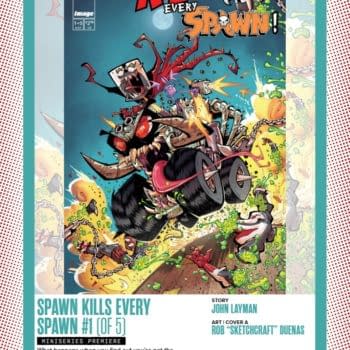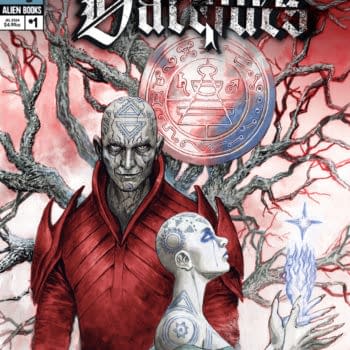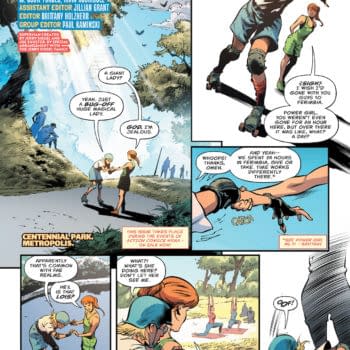Posted in: Comics | Tagged:
New Asterix Comic Uses "Omni-Shambles"…
The English translations of the Asterix comic books by Anthea Bell and Derek Hockridge have often been praised for their intelligence in rewriting jokes, adding references and truly localising the stories of Asterix to the British audience. And comparisons with other English translations, such as for the USA, only underline their skill.
The new volume, Asterix And The Chariot Race with a print run of five million sees Asterix and Obelix taking part in a race around Italy, in an attempt to show that Italy is and was not just Rome, as may have been portrayed in other Asterix comics, as well as bringing back representatives of all sorts of other nations in the race, as previously portrayed in other Asterix books.
So we have Pavarotti proselytising on behalf of his hometown chair designers…
Racing past the Mona Lisa in mid-pose…
One of the best names for one of the viking racers , Skinnidecaf, though Gamefralaf is up there.
The building of Venice having issues right at the beginning…
And the potential invention of pizza, with the note that tomatoes wouldn't arrive for another 1700 years.
But of all the references and all the asides, could by favourite be an insult from the Norsemen and Sarmatians.
"Omni-shambles".
Omnishambles is a neologism first used in the BBC's The Thick of It. The word refers to a situation that is seen as shambolic from all possible perspectives. It gained popularity in 2012 after sustained usage in the political sphere led to its being named Oxford English Dictionary Word of the Year, and it was formally added to the online editions of the Oxford Dictionary of English in August 2013.
The term, coined by writer Tony Roche, was first used at the end of the first episode of the third series of BBC political satire The Thick of It, broadcast in 2009, during which Nicola Murray (Rebecca Front) is drafted in as a cabinet minister for the fictional Department of Social Affairs and Citizenship at the behest of the government's director of communications Malcolm Tucker (Peter Capaldi). Tucker believes Murray to be a potential cause of political controversy, and his patience expires when it is revealed the minister is claustrophobic when she refuses to enter a lift. Tucker then delivers an angry rebuke to her.
The term was later popularised by Labour Party leader and Leader of the Opposition Ed Miliband MP, in a speech to the House of Commons during Prime Minister's Questions on 18 April 2012, criticising the government's 2012 budget and the resulting public image.
On charities, the reality is that the Prime Minister is not making the rich worse off. He is making charities worse off. Over the past month we have seen the charity tax shambles, the churches tax shambles, the caravan tax shambles and the pasty tax shambles, so we are all keen to hear the Prime Minister's view on why he thinks, four weeks on from the Budget, even people within Downing Street are calling it an "omnishambles Budget."
Due to its adoption as a political catchprase, the editors of the Collins English Dictionary submitted the word for the dictionary's first public consultation into new additions, defining it as "something which is completely and continuously shambolic".
A similar term, "Romneyshambles" was created as a political attack during the 2012 United States presidential election, based on comments Republican Party nominee Mitt Romney made criticizing London's preparations for the 2012 Summer Olympics.
On 13 November 2012, omnishambles was named Word of the Year by the Oxford English Dictionary. Lexicographer and judge on the panel Fiona McPherson remarked that: "It was a word everyone liked, which seemed to sum up so many of the events over the last 366 days in a beautiful way."
The word was formally added to the online editions of the Oxford Dictionary of English in August 2013.
But the real sign of its acceptance into the lexicon of the English Language has to be this adoption by Asterix….
Asterix And The Chariot Race was published in the UK this week.




















